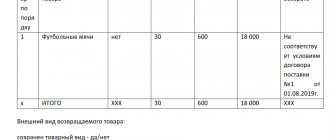Sales and purchase agreements are the most common types of transactions that are carried out on an ongoing basis by all citizens without exception. Some may argue that he has never signed any documents as a seller or buyer in his life.
Even if a person does not sign any paper documents, this does not mean that he does not make transactions. The fact is that even the most ordinary purchase of food products at the store closest to your home is also a transaction.
Buying a loaf of bread or a carton of milk is a sales transaction carried out without a bilateral agreement, the written form of which is confirmed at most by a receipt (cash or sales receipt).
Unfortunately, there are often cases when disputes arise between the seller and the buyer - either the product turned out to be of inadequate quality, or it failed during the warranty period.
But the list of possible controversial situations is not limited to them.
If the required product is not available, the buyer may agree to supply the product in the future. In this case, the seller, as a rule, asks for an advance payment for the goods - in full or in part.
What should the buyer do if payment has been made, but the buyer has not received the goods within the agreed time frame? The law provides for legal mechanisms to protect the rights of buyers.
How to return money for undelivered goods
What if the supplier, who received advance payment, did not deliver the goods within the time specified in the contract? the buyer has the right to demand (clause 3 of article 487 of the Civil Code of the Russian Federation):
- transfer of paid goods;
- return of funds paid.
In both cases, from the moment of expiration of the delivery period, the buyer can collect interest for the use of other people's funds under Art. 395 of the Civil Code of the Russian Federation, based on the size of the key rate established by the Bank of Russia. If the buyer is an individual, the penalty will be 0.5 percent of the advance payment amount for each day of delay (Clause 3, Article 23.1 of the Law “On Protection of Consumer Rights” dated 02/07/1992 No. 2300-1).
To return an item you need:
- submit a claim to the supplier; this is a mandatory step for legal entities and entrepreneurs (Part 5, Article 4 of the Arbitration Procedure Code of the Russian Federation). Individuals can submit a claim, but are not required to do so. If the contract provides for a mandatory claim procedure, the court may recognize such a condition as void, since Law No. 2300-1 does not provide for such a procedure (clause 11 of the Review of Judicial Practice in Cases of Protection of Consumer Rights, approved by the Presidium of the Supreme Court of the Russian Federation on October 14, 2020 );
- file a claim in court.
Next, we will dwell on each point in detail.
Basic rules for writing a letter to resolve the current situation
If oral agreements have not brought any results, except for the headache that has begun, then a more effective method should be taken - filing a written complaint.
It must reflect the rationale and essence of the demands - return the money, as well as pay penalties.
The pre-trial claim procedure will be very useful if the case goes to court. The buyer, who first filed a claim and only then went to court, will quite rightly act as a party during the legal proceedings that he has exhausted all possible ways to protect his rights, and only after that he went to court.
The claim can be delivered personally to the seller or sent by mail. In practice, sometimes cases arise when the seller manages to prove that the claim was accepted by an unauthorized person who has nothing to do with the seller at all.
In this case, if the buyer tries to return the goods on the basis of Articles 314, 457 of the Civil Code of the Russian Federation, he may have serious problems with the evidence base.
To avoid this, you can send a claim via Russian Post by registered mail. This will constitute proper notice. Even if the seller does not collect the claim from the post office, these will be purely his personal problems. The consumer has completed the notification.
The claim form is not established by law, but it is recommended to include the following information:
- Information about the parties (full name, addresses, details, contacts);
- Description of the controversial situation, date of sale (confirmed by receipt);
- Indication of the buyer's requirements, the amount that must be returned by the seller;
- Date and signature of the buyer.
When going to court, you must attach a copy of the previously submitted claim.
How to write a complaint to a supplier for undelivered goods
There are no special requirements for the content of a claim in the law. In practice, the letter usually consists of an introductory and descriptive part, requirements for the supplier, a list of attachments and the signature of an authorized person.
The introductory part of the claim should indicate:
- addressee - that is, the person indicated in the contract as the supplier. It is necessary to list the name of the supplier, including its legal form, OGRN, INN, address given in the Unified State Register of Legal Entities, and contact telephone number. You can also register the postal address (if it is in the contract) or the email address of the addressee (if such a possibility is expressly provided for in the contract) (paragraphs 4, 5 of the “Review of the practice of application by arbitration courts of the provisions of procedural legislation on mandatory pre-trial dispute resolution”, approved by the Presidium Supreme Court of the Russian Federation 07/22/2020);
- your data (organizational and legal form, name, OGRN, INN, KPP, location address, contact phone number, email address);
- date and reference number of the claim.
In the descriptive part you must write:
- details of the supply agreement (date of conclusion, number);
- what is the violation of obligations by the supplier, indicating the clause of the contract and the rule of law. In our case – non-delivery of goods within the period established in the contract;
- evidence of violation (describe that an advance payment was made, but the goods were not delivered);
- as requirements to the supplier, it is necessary to inform: “We ask you to return the amount of the advance payment,” and also indicate the exact amount of money and the period within which the supplier must satisfy such requirements. In addition to the prepayment amount, you can demand payment of interest under Art. 395 of the Civil Code of the Russian Federation or penalties under clause 3 of Art. 23.1 of Law No. 2300-1.
We recommend that you attach copies of the following to your claim:
- supply agreements;
- documents that confirm the violation and justify your demands (papers confirming prepayment, calculations of penalties under clause 3 of Article 23.1 of Law No. 2300-1 or interest under Article 395 of the Civil Code of the Russian Federation).
The document should be sent to:
- specified in the contract as the exclusive address for sending legally significant messages (Article 165.1 of the Civil Code of the Russian Federation, paragraph 64 of the Resolution of the Plenum of the Supreme Court of the Russian Federation “On the application by courts of certain provisions of Section I of Part One of the Civil Code of the Russian Federation” dated June 23, 2015 No. 25);
- specified in the Unified State Register of Legal Entities, if the supplier is a legal entity. If the claim is delivered to this address, it is considered received, even if it is not located there (Clause 3, Article 54 of the Civil Code of the Russian Federation). If the counterparty is an individual entrepreneur, the document must be sent to the address reflected in the Unified State Register of Entrepreneurs. At the same time, sending a claim to another address specified in the contract will also indicate compliance with the claim procedure (clause 4 of the “Review of the practice of application by arbitration courts of the provisions of procedural legislation on the mandatory pre-trial procedure for resolving a dispute”, approved by the Presidium of the Supreme Court of the Russian Federation on July 22, 2020);
- to the counterparty’s email address, if the terms of the contract clearly and unambiguously allow the use of this method of sending a claim (clause 5 of the Review of Practice, approved by the Presidium of the RF Armed Forces on July 22, 2020).
You can send a claim in a way that is established by the contract as the exclusive method for sending legally significant messages. If this method is not specified, we recommend sending the documents:
- by mail by letter with the declared value and an inventory of the contents. Moreover, as a general rule, sending a pre-trial claim exclusively in this way is not necessary (clause 9 of the “Review of Practice”, approved by the Presidium of the RF Armed Forces on July 22, 2020), however, in practice, this will help to avoid disputes related to the content of the letter sent to the counterparty;
- by courier - under the signature of a person authorized by the counterparty to receive the person’s correspondence, for example, on a copy of a claim or in the register of shipments;
- by email - if such a possibility is clearly and unambiguously provided for in the contract.
It is necessary to keep all documents that confirm the fact of sending and delivery of the claim. For example, a postal receipt and a list of attachments when sent by mail, a delivery receipt, tracking information (for example, from the Russian Post website), a fax transmission report, or a printout of an email delivery notification. They will need to be attached to the claim to confirm compliance with the pre-trial claim procedure, if it is mandatory (clause 7, part 1, article 126 of the Arbitration Procedure Code of the Russian Federation).
If the statement of claim contains information about documents confirming compliance with the pre-trial procedure for resolving the dispute, but such documents are not presented, the court will leave the claim without progress (clause 13 of the Review of Practice, approved by the Presidium of the RF Armed Forces on July 22, 2020).
In addition, such documents may be needed if the counterparty does not respond to the claim or responds to it late. With their help, it is possible to prove that he violated the pre-trial procedure for resolving a dispute, which is provided for by law or contract. In this case, the court, regardless of the results of the consideration of the case, will assign all legal costs to the violator (Part 1 of Article 111 of the Arbitration Procedure Code of the Russian Federation).
Making a claim
Regardless of the type of purchase and sale transaction, in order to return money for undelivered goods, the buyer must send a written statement to the seller, which will set out the above requirement (return of money + payment of penalties/penalties provided for by law/contract).
Download
Claim for refund for undelivered goods.doc
When compiling it, the following structural and content features should be taken into account:
- Details of the parties (last name, first name, patronymic, legal address of the seller and residential address of the buyer, contact information (telephone, email address);
- Description of the essence of submitting the application, indicating the name and cost of the goods, the agreed terms of its delivery and other relevant information;
It would not be amiss to mention the availability of additional documentation confirming the specified data (checks, receipts, contracts, etc.).
- The “Requirements” part sets out the requirements for the seller (return of money, payment of the amount of accrued penalties, etc.);
When making demands, it is important to refer to the relevant legislation that will confirm their legality.
- At the very end, the date of submission of the application is indicated, as well as the personal signature of the applicant.
Info
If the seller does not provide a response within the allotted time (7-10 days) or refuses to satisfy the specified requirements of the buyer, he has the right to apply to the court in order to defend his legal rights and interests.
Is it possible to force the violator to fulfill his obligations?
There are two options to force the seller to deliver the paid goods:
- For things that fall into the category of individually defined. Such an item is one of a kind and differs from other similar items. This includes things with owner registration (real estate, vehicles) or those with proven cultural value (antiques, works of art). That is, these are all items that can be called exclusive, for which it is impossible to find a replacement. If the buyer can prove that the seller has an individually defined item in stock, then he can force it to be delivered (Article 463 of the Civil Code of the Russian Federation). In other cases, only full compensation of the money spent is possible.
- For things with generic characteristics. This includes all items that can be replaced with similar ones from their category. In this case, there is no need to prove availability, since the product is not exclusive and can be easily replaced with an analogue. By skipping this step, you can force the seller to deliver the purchased item. Refunds are also possible for this category of items.
Oral negotiations
For the first step, a phone call with a clear request for a refund will be enough. To do this, you will need to first clearly formulate phrases and support them with references to current legislation.
As a rule, sellers are interested in ensuring that the contract is not terminated and that the money is not returned to the buyer. Since its reputation in the market and the loyalty of other consumers depend on this interaction.
At this stage, it is possible to agree on alternative ways to solve the problem: revising delivery times or replacing the product with a similar offer. The parties agree on the conditions for providing a replacement on individual terms.
It is worth remembering that such oral negotiations do not have legal confirmation and may not always lead to a resolution of the conflict situation. If the seller categorically refuses to solve the problem peacefully, then you need to move on to the next step and send him a claim.
Correct filing of a claim
The claim must be made only in writing, in two copies, with the obligatory indication of the following data:
- information about the seller: full name, details, registration address, full name of the manager;
- information about the applicant. This includes: full name, residential address, contacts. If the consumer is a legal entity, then information is provided in accordance with its status;
- the name of the claim is “Application for refund”;
- a statement of the essence of the problem listing the terms of the contract that were violated. Payment receipts are attached as evidence;
- requirements made by the buyer. This indicates the need for a refund and payment of a penalty;
- account details for transferring funds (if the payment will be transferred by bank transfer);
- list of documents that are attached to the claim. These papers act as evidence that the buyer is right;
- date of preparation and signature of the applicant. For legal entities - the seal of the organization.
Resolving the issue through court
If it was not possible to resolve the conflict through a claim, and the seller still refuses to refund the money, then the solution to the situation is to go to court. To submit an appeal to this authority, you must wait for the reimbursement time specified in the claim. Typically, it is about 10 days from the date of filing. Then sue.
To do this, you need to send a statement of claim to this authority, which will serve as the basis for starting a trial. The claim is filed at the actual location of the defendant. An exception may be the disappearance of the seller or the inability of the plaintiff to get to the court at his location (for example, due to illness). In this case, the claim is filed in the nearest court.
The court depends on the size of the claims and the amount of damage:
- If the amount of damage does not exceed 50,000 rubles, the application should be submitted to the magistrate's court.
- In case proceedings involving an amount exceeding 50,000 rubles, the claim is considered by a district judge.
The statement of claim is drawn up in accordance with the general requirements of legislation in this area. This document includes the following information:
- name of the court where the application is filed;
- information about the defendant and plaintiff, indicating full addresses and contact details;
- a detailed description of the conflict situation listing the buyer’s rights that the seller violated. Links to legislative acts are also provided here;
- the formulated requirement to the seller is a refund;
- indication of the amount of monetary compensation, taking into account penalties or moral damages;
- list of documents attached to the claim;
- date of compilation and signature of the plaintiff.
Short delivery or non-delivery?
The Civil Code of the Russian Federation, when considering issues of deliveries under relevant contracts, does not explain what exactly is considered a shortfall. Nevertheless, buyers, unfortunately, often encounter this phenomenon in practice. The courts have accumulated enough precedents related to short deliveries, so the following definition has emerged.
Question: What are the features of calculating penalties for short delivery or late delivery of a consignment of goods? View answer
Shortage of goods is a violation by the supplier of the conditions specified in the supply contract or other shipping documents regarding the volume of goods actually delivered. In other words, less goods arrived at the buyer’s warehouse than was indicated:
- in the supply contract;
- on the invoice;
- in the invoice, etc.
IMPORTANT INFORMATION! According to existing judicial precedent, short delivery also includes the inability to sample goods if the supplier is at fault.
A delay in the delivery of all goods or its next batch does not apply to non-delivery - such a violation is called non-delivery .
What is the buyer's procedure if (quantity discrepancy) is detected upon acceptance of the goods
When is a refund possible?
First, let's discuss an important detail, the understanding of which will be necessary in the future. There are 2 types of returns as such: partial refund for the product and full refund for the product. In the first case, you generally don’t mind keeping the product, but due to some flaws, your pleasure from using this product is spoiled, and you want to get compensation. In the second case, you refuse the purchase altogether - cancel the order (if possible) or return the already delivered package to the seller. Having secured this, let’s move on to situations in which you can get a refund:
- The product has arrived to you, but you no longer want to use it for some personal reason . In the summer of 2021, Aliexpress slightly changed its policy regarding returns - it introduced 15-day post-support, according to which the buyer, after confirmation of receipt, has the right to return the item to the seller and receive full compensation for it. Presumably, this is due to the fact that clothes are often ordered from Ali, and they often do not fit properly, since our size charts and size charts in China are significantly different. In any case, a full refund is possible here.
- The order has not yet been paid/has already been paid, but is in the “Waiting to be dispatched” status. In this case, you can initiate cancellation and you will receive a full refund.
- The order has not reached you . Since Aliexpress took seriously the issues of delivery and catching unscrupulous sellers, such cases have become rare, but sometimes such a situation does occur. Here you need to figure out where the order ended up. If the tracking code says that your package is waiting for you at the nearest post office, and you demand compensation, you are unlikely to be able to convince anyone. If the parcel is located in an unknown location, and the seller is openly fussy in correspondence and does not want to continue protecting the buyer, you need to escalate the dispute and seek a full refund.
- The product turned out to be defective . It’s a difficult situation, because the fact of the defect still needs to be proven, but if you succeed, you can get a full refund without shipping (but you’ll have to spend money on an expert’s opinion on the defect). It is better to pack defective items and send them back to the seller.
- The product was damaged. Both full and partial refunds are possible here. If the damage is critical, or you absolutely need a fully functional item, you need to return the parcel back to China and receive full compensation. If you are generally satisfied with the performance/suitability of the item, but there is still a problem, seek a partial refund. This way you can get back up to 90% of the cost.
- You came to the post office, and the package turned out to be opened . In this unpleasant case, the postal workers are to blame, but the seller must deal with this, because, firstly, he guarantees the integrity of the delivery, and secondly, the parcel is insured. What should you do? In this case, you need to directly ask the post office to open the parcel by the employees (and record this in the opening report), and if something happened to the purchase, write a refusal to receive it, after which the parcel will go back to China.
If you want to return the item back to the seller, you will have to pay for shipping. Sometimes the delivery amount exceeds the cost of the goods, which makes the whole idea of a full refund unjustified. If you encounter this, seek maximum partial compensation.








